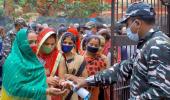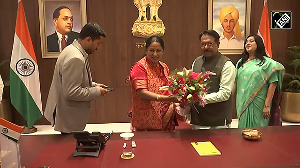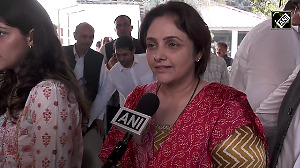'No Indian political party functions in a democratic way.'

The Election Commission of India has been facing flak for its decision to go ahead with the recent assembly elections amidst a raging coronavirus pandemic, and specifically its decision to extend polling in West Bengal over eight phases.
Critics allege that this was done at the say-so of the government, since lengthy polling would help the Bharatiya Janata Party marshal its resource better and win the elections. While the Electiob Commission rejects this charge, the fact is misgivings over its independence have grown in recent years.
As the poll body battles this credibility crisis, the Association for Democratic Reforms recently moved the Supreme Court challenging the Constitutional validity of the executive alone appointing the chief election commissioner and election commissioners, saying it creates apprehensions regarding the poll body's neutrality.
The NGO also sought the establishment of a neutral and independent collegium/selection committee for appointment of members to the Election Commission.
In its plea, ADR said, 'There has been a growing impression that the Election Commission is indulgent towards the ruling government at the Centre, and the commission has a different standard to determine the actions of the members of the ruling government and the complaints that arise during the campaign/elections.
ADR Founder Professor Jagdeep Chhokar explains to to Syed Firdaus Ashraf/Rediff.com why his organisation moved the apex court on the issue. "They (the Election Commission) are an independent body, but then independent ke bahut matlab hain (it has a lot of meanings)," Professor Chhokar says.
The chief election commissioner and the election commissioners are appointed by the President of India, a fact that the EC proclaims on its Web site. What is wrong with this process that you approached the Supreme Court on the matter?
It is not the Election Commission Web site that decides it, but the Constitution of India. So, our point is that the appointment of election commissioners is governed by the Constitution of India which says the election commissioner's appointment will be done by the President of India.
Now, there are two issues.
Firstly, the President of India does not function in his or her independent capacity, but works on the advice of the government.
Secondly, when the Constitution was drafted, there was only one position of chief election commissioner. But now we have one chief election commissioner and two election commissioners. So, there is some difference in their terms of appointments and terms and conditions of service.
It is not just getting the chief election commissioner appointed, but also how does one election commissioner become the chief election commissioner and how he does not become the chief election commissioner. These are complicated issues.
Why does the ADR have apprehensions regarding the ECI's neutrality? Can't we trust the President of India to be a neutral party in appointing the election commissioners?
(Laughs) Whether we can trust the President of India to be an independent decision-maker or not I will leave it to your judgement.
But isn't this what every Indian child is taught in civic lessons at school?
There is a huge difference in what is written (in school text books) and what is happening (in our country).
For example, the Constitution of India says that if the President of India is not able to discharge his duty for whatever reason, then it is the vice president of India who discharges his duty.
In the past, when Dr Rajendra Prasad used to go abroad for official work for two-three weeks, the vice-president used to function as the President of India.
When A P J Abdul Kalam was the President and he had visited Russia or somewhere, then to take his signature documents were faxed to Russia.
Somebody can say technology has improved but as a very learned scholar of the Indian Constitution has said, Constitutions are inert documents, they don’t work. They are worked by people.
In the second last session of the Constituent Assembly on November 25, 1949, Dr Ambedkar presented the Constitution and in his speech spoke on similar lines. And then on November 26, 1949, Dr Rajendra Prasad also said the same thing by stating Constitutions are neither good nor bad but ussey jaisa chalaya jaata hai voh vaisa chalta hain (Constitution runs the way the government wants it to run).
How can we insulate the Election Commission from political and executive interference?
Who, according to, the ADR must appoint election commissioners?
There are no perfect solutions. Democracy is not a machine.
Over the last 30 years various commissions of the Election Commission of India, Law Commission of India and various other commissions have said that instead of the chief election commissioner and election commissioners being appointed only by the government of the day, there should be a collegium which will make a recommendation to the President of India and then he will select the election commissioner.
This sounds very nice on paper that election commissioners and chief election commissioners are appointed by the prime minister of India, leader of the largest Opposition party and the Chief Justice of India. It sounds very good.
But then the CBI (Central Bureau of Investigation's) director is also appointed in the same manner and so is the central information commissioner and even the central vigilance commissioner. And you can already see what kind of appointments are being made and the CBI ka programme bhi aapne dekha hoga (you must have seen CBI programmes too).
The reality is that no political party wants their power to be curtailed in appointing election commissioners.
Let me tell you, what is wrong with Indian democracy is not that the election commissioner is appointed by President of India, but what is wrong in India is that no Indian political party functions in a democratic way.
We can have superstructures of democracy built but the pillars on which these superstructures rest are not democratic, then how can we have democracy? We cannot.
The Election Commission has been criticised for holding the West Bengal election during coronavirus and that too in eight phases. Do you think this has resulted in the public doubting the EC's credibility?
The credibility of the Election Commission's office is a different story altogether. I am working on this for the last 20 years.
People come and people go, but there are now systemic problems. And the damage done to the Election Commission will take 20 years to undo.
Twenty years to recover?
The recovery has not started yet and we are still going downhill.
L K Advani had suggested in 2012 that the election commissioner should be appointed by a broad-based collegium and the idea was supported by the Dravida Munnetra Kazagham -- then a partner of the United Progressive Alliance. Why was this idea not taken forward?
Advani had said so many things and the DMK too said lot of things then. Kehney aur karne mien bahut farak hai (to say is something but to do it is another thing). Advani had written a foreword against EVM machines. The book was written by BJP (Bharatiya Janata Party) leader G V L Narasimha Rao. Today, neither Advani speaks about it nor does GVL.
Politicians say a lot of things depending on hawa kya chal rahi hai (which way the wind is blowing).
We have not seen any election commissioner as strict as T N Seshan. How did he make politicians understand that they need to take the Model Code of Conduct seriously whereas other election commissioners were not so successful?
I don't want to discuss individuals but there have been (chief) election commissioners who did what (chief) election commissioners are supposed to do regardless of the consequences. There have been such chief election commissioners in India post T N Seshan.
Lastly, when we say our Election Commission is independent, why is it that the law ministry is the administrative ministry for the Election Commission? Why has this procedure not been discontinued till date?
(Laughs) If the Election Commission of India needs money, they have to run to the law ministry. When they want to change any rule, they have to go to the law ministry. They are an independent body, but then independent ke bahut matlab hain (has lot of meanings).
What is the solution then?
Our PIL is the only solution. In a democracy there is no perfection and we have proposed a solution. That's all. Moreover, we have not proposed this, but different commissions have proposed this for the last 30 years.











 © 2025
© 2025